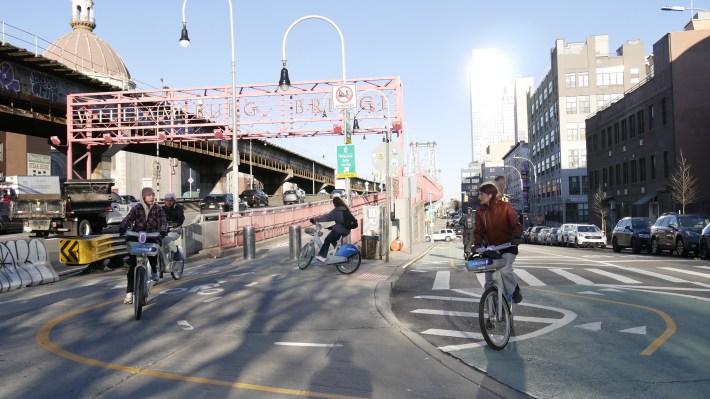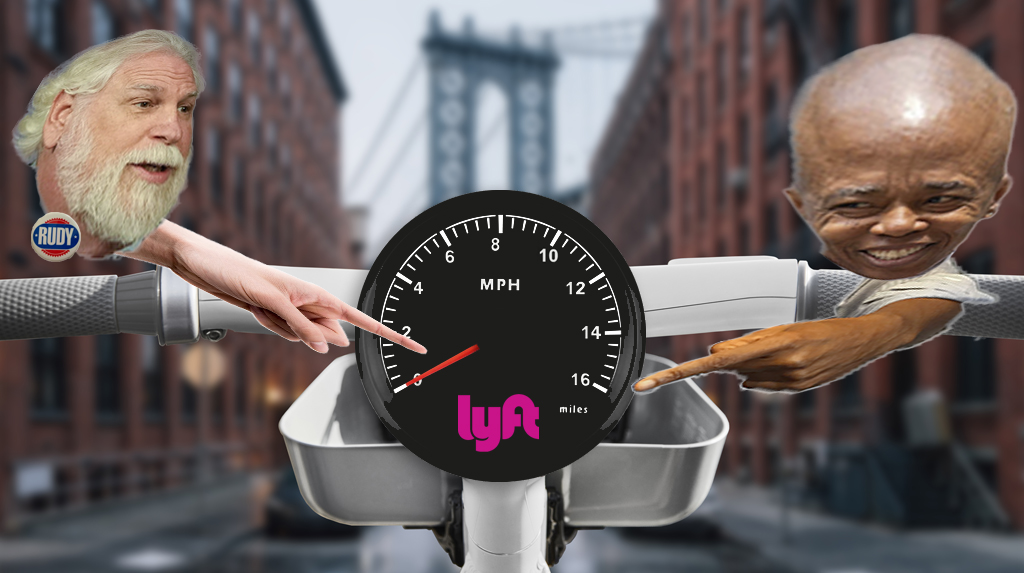Mayor Adams's new 15 mph e-bike speed limit is a bad deal for Citi Bike cyclists and potential threat to their safety, according to frustrated bike-share users who want to see the speed raised back up to 18 mph.
For Queens resident and cycling advocate Jim Burke, 59, Lyft's electric Citi Bikes have helped him keep biking after a scary health episode. Now he feels he's less safe at the slower speed and may give up on Citi Bike entirely.
"I had a heart attack and a stroke, I'm unable to bike a regular bicycle without having to stop. The Citi Bike electric bikes have been a godsend," Burke told Streetsblog. "I'm probably gonna get an electric bike on my own because I'm not gonna put myself in danger."
Lyft complied with Adams and Deputy Mayor Randy Mastro's decree last month to lower the Citi Bike e-bike's top speed by 3 mph. The company previously reduced the e-bike speed limit by 10 percent from 20 mph to 18 mph in 2023. The latest slowing-down from 18 mph to 15 mph amounts to 25 percent decrease from 2023.
At the same time, the price to ride per minute has increased — so Citi Bike users are paying more to get to their destinations later.
“It feels slower, it feels clunkier,” said one high school student and Citi Bike member for over a year who declined to give his name. “Before, I had confidence that I could move out of the way in an emergency. Now I feel a lot more unconfident — I think that will be unsafe for riders.”
Citi Bike users are prisoners of how Lyft programs its bikes — unlike cars, whose drivers can freely exceed the city's 25 mph speed limit, since speed cameras allow an 11 mph buffer before issuing tickets. The e-bikes automatically cut off motor assistance at exactly 15 mph, with no room for rider discretion, Streetsblog has found over frequent rides in recent weeks. (Lyft has not explained the mechanics of how the bike stays below 15 mph.)
While it may flow logically that slower speeds are safer, the Adams administration has not produced any data to show that 18 mph e-bikes pose a heightened risk to pedestrians or riders. Streetsblog could not identify any research to back up the alleged safety benefits of the reduced speed limit.
Riders expressed frustration with having to pedal the extremely heavy and bulky bikes at a slower pace, and without rider-controlled gears: If a cyclist needs to briefly speed up to maneuver out of harm's way, they can't.
"The speed decrease makes it more dangerous when I'm in regular car traffic," Burke said. "Now, since cars are traveling at least 20-25 miles, and with the new throttled speed... I definitely feel that I'm more unsafe now."
One native New Yorker said he hadn't noticed Citi Bike cyclists behaving any safer, either.
“I haven’t noticed Citi Bikes being any safer as a pedestrian,” said Luke Hopper, a longtime user and college student from Washington Heights. “If anything, people trying to go places are the ones being affected. Cars are still blowing past you.”
Slower rides, higher costs

Let's talk dollars. Even if the cap doesn't change safety outcomes, it still hurts riders financially.
Lyft already charges a steep base rate of $.25-per-minute for members, who also pay as much as $219.99 for the service. Assuming a Citi Bike user maintained the perfect average speed of 18 mph for a six-mile trip, it would have taken 20 minutes. The same trip at a top speed of 15 mph would take 24 minutes. At the current rate for members with an annual subscription on the e-bikes, that four minutes costs an additional $1.09. A trip that used to cost $5.44 would now cost $6.53 — a 20 percent price hike.
Lyft has not announced any price changes to match the increased ride times and perceive lower quality of the rides.
Some users have also claimed that Citi Bike's low-power assist e-bike option, which is available when e-bikes are the only option at a Citi Bike station, are much slower now as well.
"It feels like I have to pedal (about 16 percent) harder in low-assist mode since the e-bikes have been reduced to 15mph. I didn't mind it before and would usually select low-assist for the free ride. Now it sucks," one rider posted on Reddit.
Lyft hasn’t released any data on lost revenue from cancellations or declining ridership. A rep for the company did not reply to several requests for comment.
When Michael Gormally, a Citi Bike member since 2018, reached out to customer service a few weeks ago, a representative told him the throttling would be temporary for Pride, a claim that turned out to be false. Gormally then asked Citi Bike to waive his e-bike and membership fees while the throttling remained in effect, since enrolled with the understanding that e-bikes were capped at 18 mph, not 15.
"This new throttle feels different. There’s like active engine braking that seems to kick in at 12 mph, so even if you’re self-pedaling over that speed, you can’t move faster." Gormally said.
Even the popular shit-posting Instagram account @nolitadirtbag weighed in, with a video reel criticizing the 15 mph that picked up thousands of "likes."
"I may actually cancel my Citi Bike membership if they don't bump the max speed back up to 18 miles per hour," the post read. "I never thought the day would come where I would seriously consider getting an aura sucking Scandavian [sic] engineered electric bike or Liberal arts educated Fixed gear bike but this city's bureaucracy has given me no choice."
With millions of riders per month, Citi Bike has redefined how New Yorkers get around for the better. More people biking enhances safety through a positive cycle of "strength in numbers" encouraging more people to ride.
Even Eric Adams — the mayor responsible for the 15 mph speed limit — seems to understand that much: "Biking in New York City wouldn’t be what it is today without Citi Bike,” Hizzoner said in a statement back in November of 2023.
Citi Bike's white/silver e-bike, meanwhile, has only multiplied the bike-share system's popularity: Seventy percent of Citi Bike rides are done on e-bikes, which the system didn't even have a until a 2018.
The new speed cap may lead to a decrease in usage, warned Marcel Moran, a fellow at the NYU Tandon School of Engineering and expert on urban transportation policy.
"What I do think this change will do is slightly reduce the attractiveness of using these e-bikes, which is unfortunate, given there has been surging demand for Citi Bike generally, which set an annual ridership record in 2024," Moran said.






